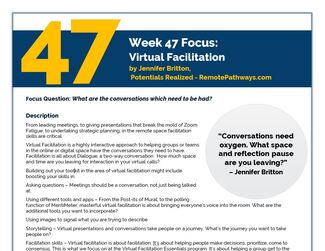 Focus Question: What are the conversations which need to be had? Description From leading meetings, to giving presentations that break the mold of Zoom Fatigue, to undertaking strategic planning, in the remote space facilitation skills are critical. Virtual Facilitation is a highly interactive approach to helping groups or teams in the online or digital space have the conversations they need to have. Facilitation is all about Dialogue, a two-way conversation. How much space and time are you leaving for interaction in your virtual calls? Building out your toolkit in the area of virtual facilitation might include boosting your skills in:
What are the things that are going to help your next virtual conversation stand out? 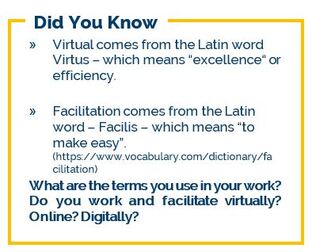 Activity Consider what type of conversations you are engaging in. Are you creating space for pause, reflection, action and dialogues? What are the skills you need – is it more about developing a mastery of facilitation tools OR focusing more on your approach to leaving space for dialogue. For more on this topic check out Jennifer’s book, Effective Virtual Conversations which explores principles and practices of virtual and online conversations across the ecosystem of virtual learning – from asynchronous approaches, webinars, coaching to team building. All the best, Jennifer Jennifer Britton
Co-host of the Remote Pathways Podcast Potentials Realized – Coaching, Training and Consulting Services for remote teams, leaders and professionals Check out the most recent Remote Pathways Podcast Episode, where we explore the people, places and processes of exceptional remote work. You can listen to the latest episode here, or on your favorite podcast player.
2 Comments
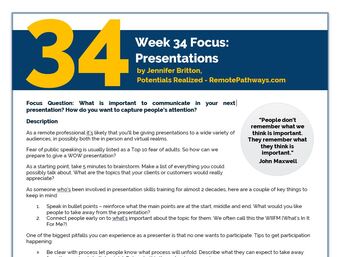 Focus Question: What is important to communicate in your next presentation? How do you want to capture people’s attention? Description As a remote professional it’s likely that you'll be giving presentations to a wide variety of audiences, in possibly both the in person and virtual realms. Fear of public speaking is usually listed as a Top 10 fear of adults. So how can we prepare to give a WOW presentation? As a starting point, take 5 minutes to brainstorm. Make a list of everything you could possibly talk about. What are the topics that your clients or customers would really appreciate? As someone who's been involved in presentation skills training for almost 2 decades, here are a couple of key things to keep in mind:
One of the biggest pitfalls you can experience as a presenter is that no one wants to participate. Tips to get participation happening:
 Activity Consider an upcoming presentation:
For more on this topic check out Section 3 of PlanDoTrack, specifically pages 81 and 82. All the best, Jennifer Jennifer Britton
Co-host of the Remote Pathways Podcast Potentials Realized – Coaching, Training and Consulting Services for remote teams, leaders and professionals Check out the most recent Remote Pathways Podcast Episode, where we explore the people, places and processes of exceptional remote work. You can listen to the latest episode here, or on your favorite podcast player. 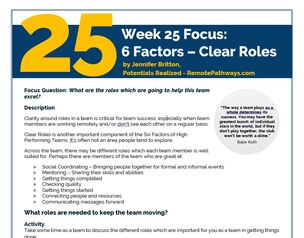 Focus Question: What are the roles which are going to help this team excel? Description Clarity around roles in a team is critical for team success, especially when team members are working remotely and/or don’t see each other on a regular basis. Clear Roles is another important component of the Six Factors of High Performing Teams. It’s often not an area people tend to explore. Across the team, there may be different roles which each team member is well suited for. Perhaps there are members of the team who are great at:
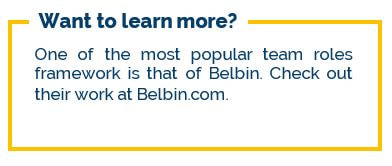 Activity Take some time as a team to discuss the different roles which are important for you as a team in getting things done. What are the roles which are going to help the team? Who plays what role? How do the roles match with the talents and skills in the team? Are there any roles that are missing? What are the roles which are going to create new things? Get things done? You will also want to explore WHAT key roles are needed by the team? Best wishes, Jennifer Jennifer Britton
Co-host of the Remote Pathways Podcast Potentials Realized – Coaching, Training and Consulting Services for remote teams, leaders and professionals Check out the most recent Remote Pathways Podcast Episode, where we explore the people, places and processes of exceptional remote work. You can listen to the latest episode here, or on your favorite podcast player. 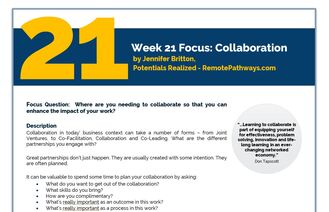 Focus Question: Where are you needing to collaborate so that you can enhance the impact of your work? Description Collaboration in today’ business context can take a number of forms – from Joint Ventures, to Co-Facilitation, Collaboration and Co-Leading. What are the different partnerships you engage with? Great partnerships don’t just happen. They are usually created with some intention. They are often planned. It can be valuable to spend some time to plan your collaboration by asking:
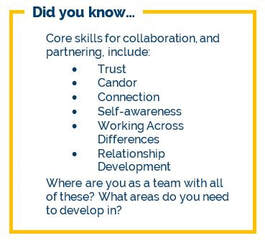 Activity Identify the collaborations you are a part of right now? What conversations need to be had? With your major tasks and projects for the next few months, what new partnerships and collaboration opportunities are needed? What requires attention? Also refer to the Collaboration Download as part of Episode 7 as part of the Remote Pathways Podcast. Listen in on your favorite podcast player or at RemotePathways.com For more on this topic check out: Teams365 #1152 - 5 Ingredients for Successful Team Leader Collaboration Best, Jennifer Jennifer Britton
Co-host of the Remote Pathways Podcast Potentials Realized – Coaching, Training and Consulting Services for remote teams, leaders and professionals Check out the most recent Remote Pathways Podcast Episode, where we explore the people, places and processes of exceptional remote work. You can listen to the latest episode here, or on your favorite podcast player. 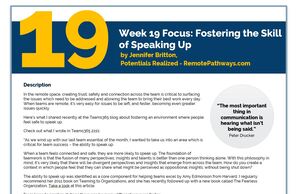 Description In the remote space, creating trust, safety and connection across the team is critical to surfacing the issues which need to be addressed and allowing the team to bring their best work every day. When teams are remote, it’s very easy for issues to be left, and fester, becoming even greater issues quickly. 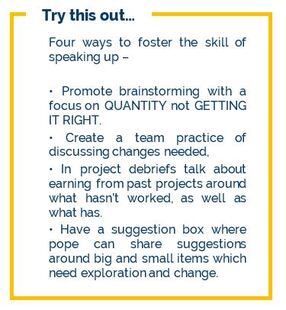 Here’s what I shared recently at the Teams365 blog about fostering an environment where people feel safe to speak up. Check out what I wrote in Teams365 2221: “As we wind up with our last team essential of the month, I wanted to take us into an area which is critical for team success – the ability to speak up. When a team feels connected and safe, they are more likely to speak up. The foundation of teamwork is that the fusion of many perspectives, insights and talents is better than one person thinking alone. With this philosophy in mind, it’s very likely that there will be divergent perspectives and insights that emerge from across the team. How do you create a context in which people feel that they can share what might be perceived as oppositional insights, without being shut down? The ability to speak up was identified as a core component for helping teams excel by Amy Edmonson from Harvard. I regularly recommend her 2011 book on Teaming to Organizations, and she has recently followed up with a new book called The Fearless Organization. Take a look at this article. From large to small invitations there can be many different ways we foster conversation across a team. This might include:
What other barriers are being created around inviting everyone’s voice to the table?” Activity Have a discussion this week around what Speaking Up can look like in your team or organization, and what the value of it is. For more on this topic check out: Speak Up, Show Up and Stand Out – Loretta Malandro Teaming – Amy Edmondson Best wishes, Jennifer Jennifer Britton
Co-host of the Remote Pathways Podcast Potentials Realized – Coaching, Training and Consulting Services for remote teams, leaders and professionals Check out the most recent Remote Pathways Podcast Episode, where we explore the people, places and processes of exceptional remote work. You can listen to the latest episode here, or on your favorite podcast player. 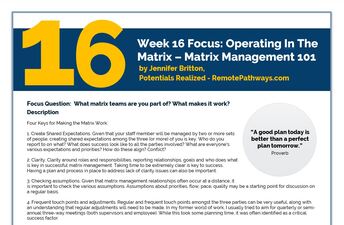 Focus Question: What matrix teams are you part of? What makes it work? Description Four Keys for Making the Matrix Work: 1. Create Shared Expectations. Given that your staff member will be managed by two or more sets of people, creating shared expectations among the three (or more) of you is key. Who do you report to on what? What does success look like to all the parties involved? What are everyone's various expectations and priorities? How do these align? Conflict? 2. Clarity. Clarity around roles and responsibilities, reporting relationships, goals and who does what is key in successful matrix management. Taking time to be extremely clear is key to success. Having a plan and process in place to address lack of clarity issues can also be important. 3. Checking assumptions. Given that matrix management relationships often occur at a distance, it is important to check the various assumptions. Assumptions about priorities, flow, pace, quality may be a starting point for discussion on a regular basis. 4. Frequent touch points and adjustments. Regular and frequent touch points amongst the three parties can be very useful, along with an understanding that regular adjustments will need to be made. In my former world of work, I usually tried to aim for quarterly or semi-annual three-way meetings (both supervisors and employee). While this took some planning time, it was often identified as a critical success factor. Originally published as https://www.potentialsrealized.com/teams-365-blog/teams365-594-matrix-management-4-keys-to-making-it-work) Who do you have in your relationship web? 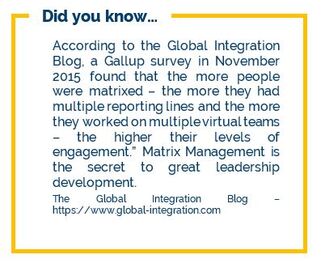 Activity Note the conversations you want to have with those you are in matrix relationships with. When are you meeting as a group of three? What are the things you want to have discussion around? For more on this topic check out: Teams365 blog posts on this topic over at Potentials Realized.com Including:
All the best, Jennifer Jennifer Britton
Co-host of the Remote Pathways Podcast Potentials Realized – Coaching, Training and Consulting Services for remote teams, leaders and professionals Check out the most recent Remote Pathways Podcast Episode, where we explore the people, places and processes of exceptional remote work. You can listen to the latest episode here, or on your favorite podcast player. 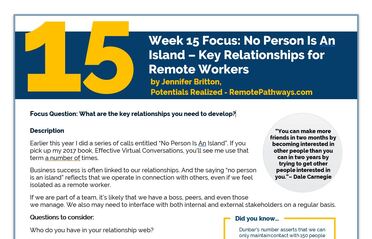 Focus Question: What are the key relationships you need to develop? Description Earlier this year I did a series of calls entitled “No Person Is An Island”. If you pick up my 2017 book, Effective Virtual Conversations, you’ll see me use that term a number of times. Business success is often linked to our relationships. And the saying “no person is an island” reflects that we operate in connection with others, even if we feel isolated as a remote worker. If we are part of a team, it’s likely that we have a boss, peers, and even those we manage. We also may need to interface with both internal and external stakeholders on a regular basis. 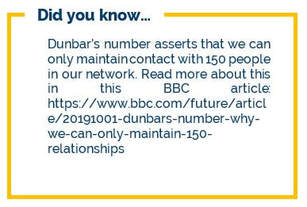 Questions to consider:
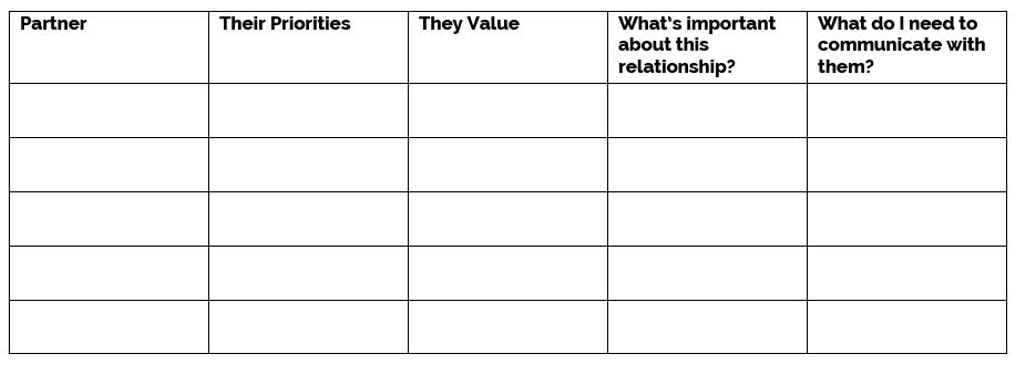 Activity For each key relationship, work through the questions listed here. For more on this topic check out: Check out the Top 20 Activities in PlanDoTrack, as well as the Relationship Mapping Exercise. Enjoy! Jennifer Jennifer Britton
Co-host of the Remote Pathways Podcast Potentials Realized – Coaching, Training and Consulting Services for remote teams, leaders and professionals Check out the most recent Remote Pathways Podcast Episode, where we explore the people, places and processes of exceptional remote work. You can listen to the latest episode here, or on your favorite podcast player. 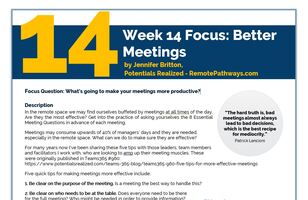 Focus Question: What’s going to make your meetings more productive? Description In the remote space we may find ourselves buffeted by meetings at all times of the day. Are they the most effective? Get into the practice of asking yourselves the 8 Essential Meeting Questions in advance of each meeting. Meetings may consume upwards of 40% of managers’ days and they are needed, especially in the remote space. What can we do to make sure they are effective? For many years now I’ve been sharing these five tips with those leaders, team members and facilitators I work with, who are looking to amp up their meeting muscles. These were originally published in Teams365 #960. Read it here. 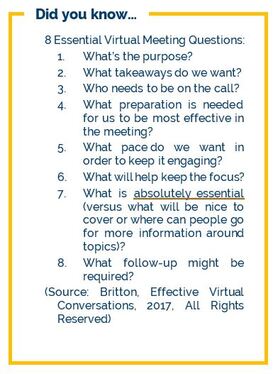 Five quick tips for making meetings more effective include: 1. Be clear on the purpose of the meeting. Is a meeting the best way to handle this? 2. Be clear on who needs to be at the table. Does everyone need to be there for the full meeting? Who might be needed in order to provide information? Decisions? Authority? Make sure you know who will need to be there or else it may mean another meeting. Having everyone there all the time may actually slow the meeting down. At this point, you will want to start considering who needs to be there, when. 3. What is the outcome you desire? What are the 3-5 tangible takeaways you want from the meeting? This question will help to reinforce what the purpose is, and who really should be at the table. 4. What decisions have been made? What outcomes are expected, and what are the timelines? Who is responsible for doing this? Tracking it? Reporting on it? What will follow up look like? Being granular in this stage is key to success. Many times, it is glossed over. Be sure to leave sufficient time to summarize key decisions made, and implications of this. 5. Keep to time. Time management is an art form with effective meetings. Being too lax with time can lead to frustration and disengagement. If timing tends to fall off, assign someone a timekeeper role, and put your stronger facilitator in the chair seat to keep the meeting moving. Tangents don't always benefit meetings. The cost of NOT undertaking meetings is high. What’s the right balance for your team in terms of sharing information and also making them most efficient? For more on this topic check out: Effective Virtual Conversations Chapter 9 – In Focus: Virtual Meetings of All Stripes Best wishes, Jennifer Jennifer Britton
Co-host of the Remote Pathways Podcast Potentials Realized – Coaching, Training and Consulting Services for remote teams, leaders and professionals Check out the most recent Remote Pathways Podcast Episode, where we explore the people, places and processes of exceptional remote work. You can listen to the latest episode here, or on your favorite podcast player. 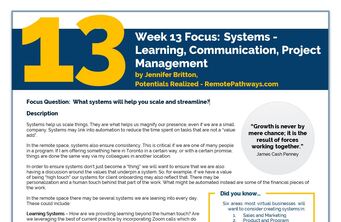 Focus Question: What systems will help you scale and streamline? Description Systems help us scale things. They are what helps us magnify our presence, even if we are a small company. Systems may link into automation to reduce the time spent on tasks that are not a “value add”. In the remote space, systems also ensure consistency. This is critical if we are one of many people in a program. If I am offering something here in Toronto in a certain way, or with a certain promise, things are done the same way via my colleagues in another location. In order to ensure systems don’t just become a “thing” we will want to ensure that we are also having a discussion around the values that underpin a system. So, for example, if we have a value of being “high touch” our systems for client onboarding may also reflect that. There may be personalization and a human touch behind that part of the work. What might be automated instead are some of the financial pieces of the work. 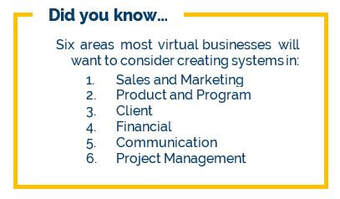 In the remote space there may be several systems we are leaning into every day. These could include: Learning Systems – How are we providing learning beyond the human touch? Are we leveraging the best of current practice by incorporating Zoom calls which do get recorded if people can’t make them? Are we creating a Learning Management System where people can go to access information and on-demand learning modules? Popular learning systems include Teachable, Kajabi, Thinkific to name a few. Corporations will have their own learning management systems. Project Management Systems – Projects are at the heart of most small businesses. From courses we want to create to marketing initiatives, there are many different ways we can focus on scaling. Popular project management systems include Trello, Asana, Monday.com. Communication is at the heart of any remote team or business. What are you doing to ensure that you are leveraging all the communication elements you want? This may include: Chat based systems; video-based meeting platforms like Zoom; or voice related apps like WhatsApp and Voxerr (where you can leave a voice message), or LOOM (where you can leave a video message). What are the systems you want to leverage so you can accelerate your work and take it to the next level?  Activity Think about these four areas of work – learning, project management, financial and communication. What new additions could you add to help amplify your efforts? For more on this topic check out: Section 3 of PlanDoTrack All the best, Jennifer Jennifer Britton
Co-host of the Remote Pathways Podcast Potentials Realized – Coaching, Training and Consulting Services for remote teams, leaders and professionals Check out the most recent Remote Pathways Podcast Episode, where we explore the people, places and processes of exceptional remote work. You can listen to the latest episode here, or on your favorite podcast player. 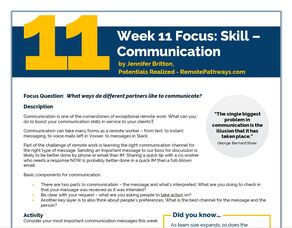 Focus Question: What ways do different partners like to communicate? Description Communication is one of the cornerstones of exceptional remote work. What can you do to boost your communication skills in service to your clients? Communication can take many forms as a remote worker – from text, to instant messaging, to voice mails left in Voxxer, to messages in Slack. Part of the challenge of remote work is learning the right communication channel for the right type of message. Sending an important message to our boss for discussion is likely to be better done by phone or email than IM. Sharing a quick tip with a co-worker who needs a response NOW is probably better done in a quick IM than a full-blown email. Basic components for communication:
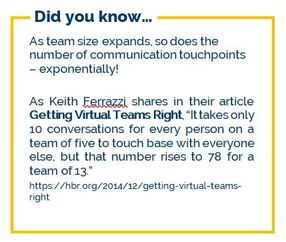 Activity Consider your most important communication messages this week. Ask yourself:
For more on this topic check out: Communication in general is the main focus of my 2017 book, Effective Virtual Conversations. Be sure to read the relevant chapters – for example, chapters 9 – 11 if you are a virtual or remote team, or Best, Jennifer Jennifer Britton
Co-host of the Remote Pathways Podcast Potentials Realized – Coaching, Training and Consulting Services for remote teams, leaders and professionals Check out the most recent Remote Pathways Podcast Episode, where we explore the people, places and processes of exceptional remote work. You can listen to the latest episode here, or on your favorite podcast player. |
AuthorThe Remote Pathways blog follows many of the themes we explore in the Remote Pathways Podcast. This year (2020) we're proud to bring you a 52 week-series for you to follow along throughout the year. Posts are penned by co-host Jennifer Britton, an avid award-winning blogger for many years. Jennifer is the author of five books. Visit her author page on Amazon. Archives
December 2020
Categories
All
|
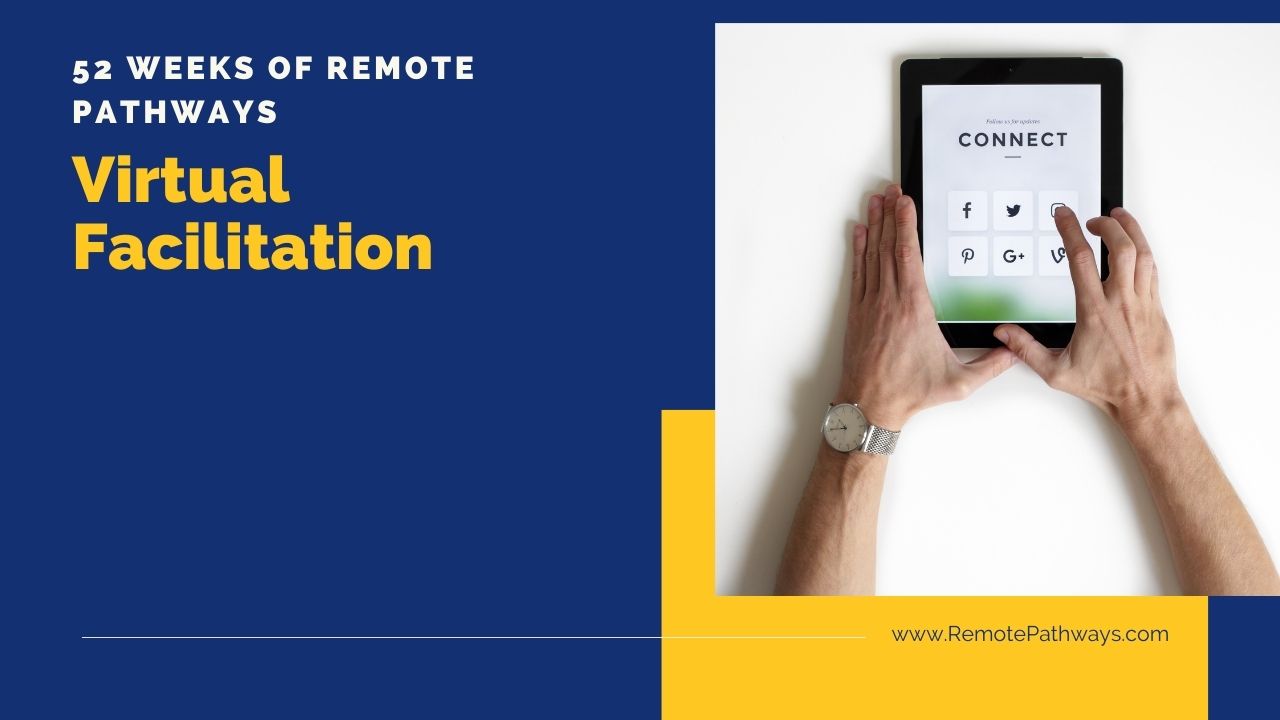

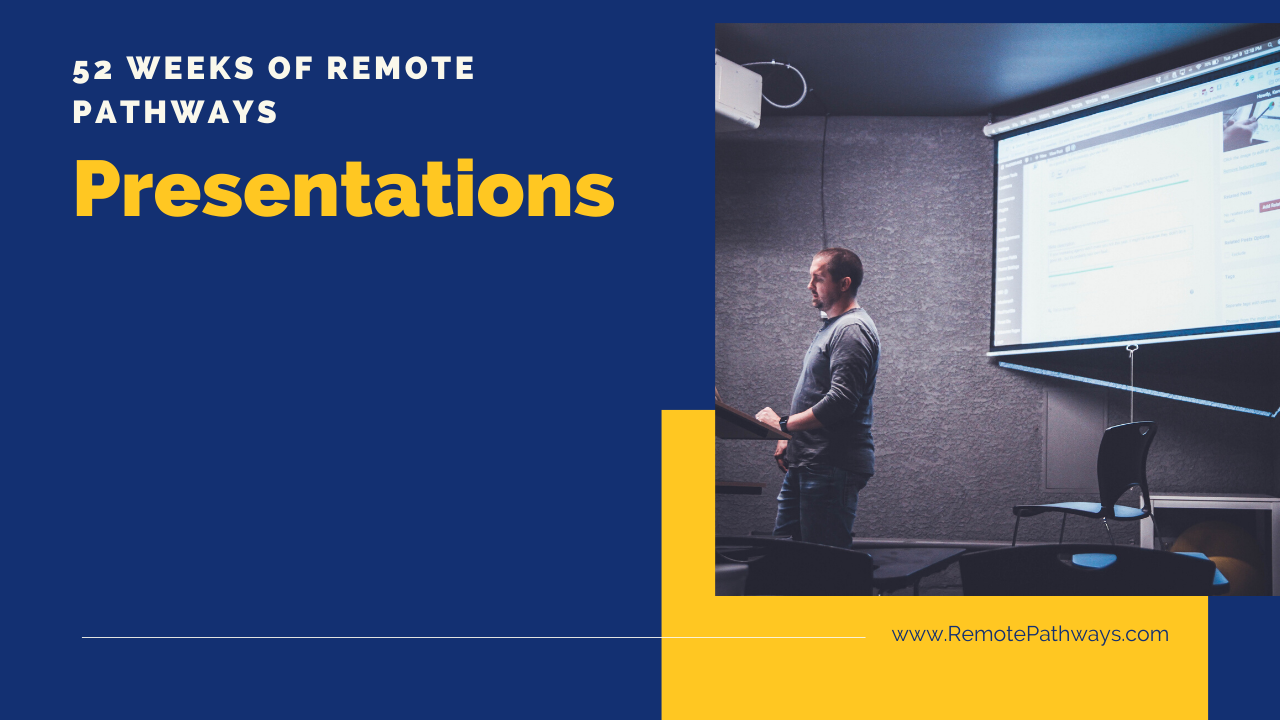
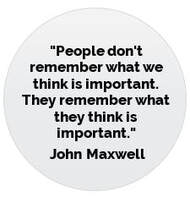

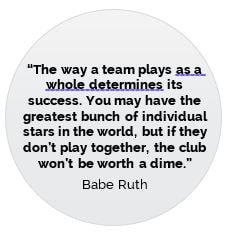
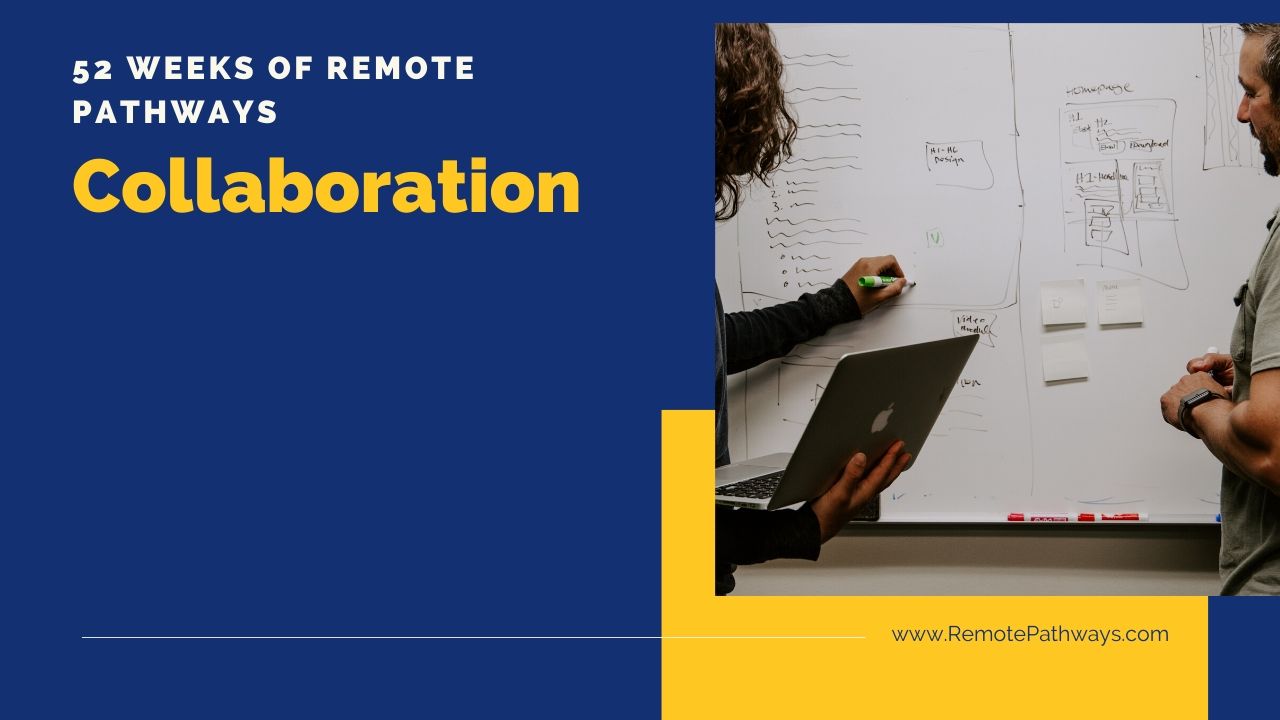
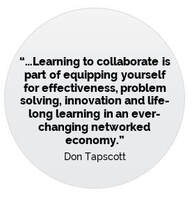

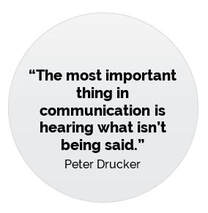
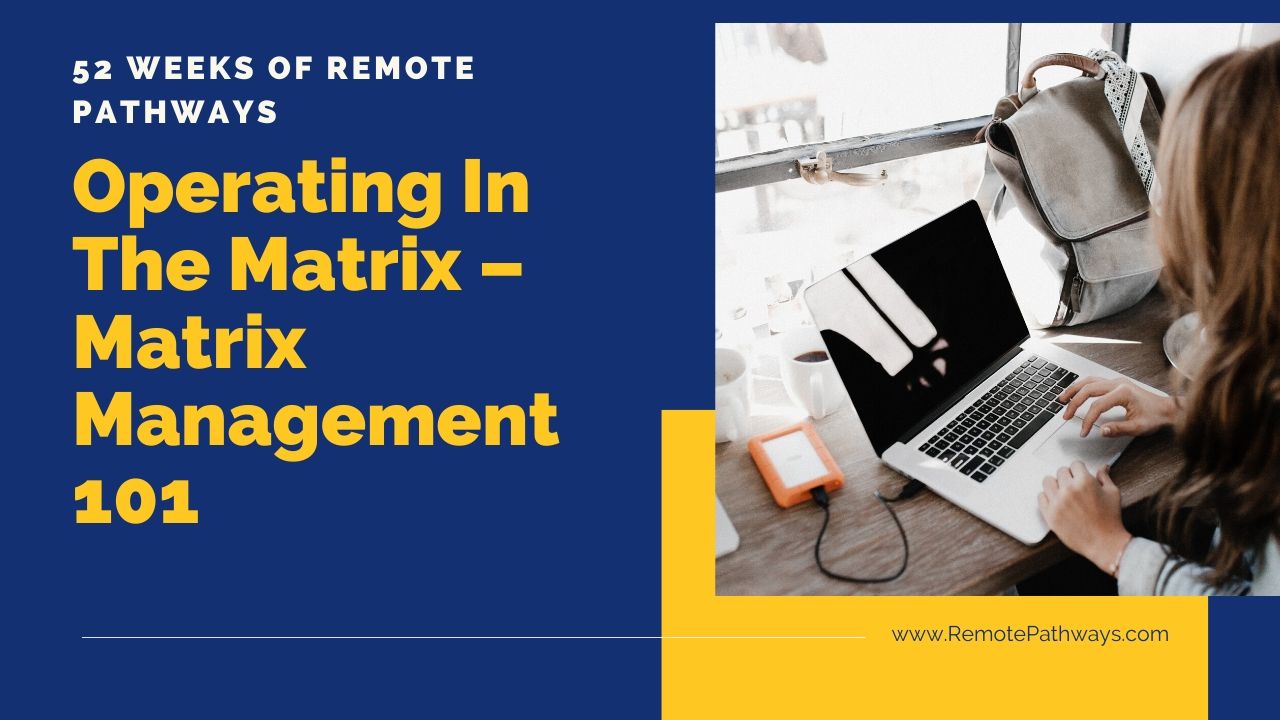

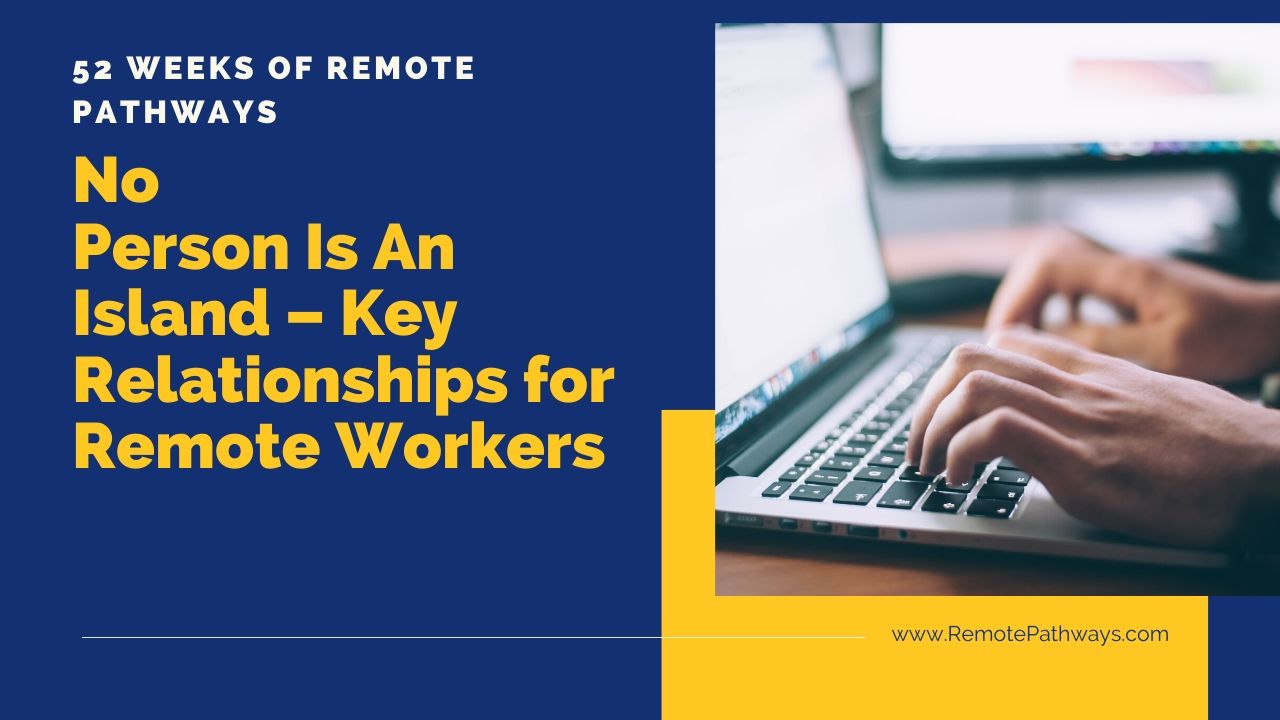
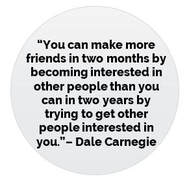
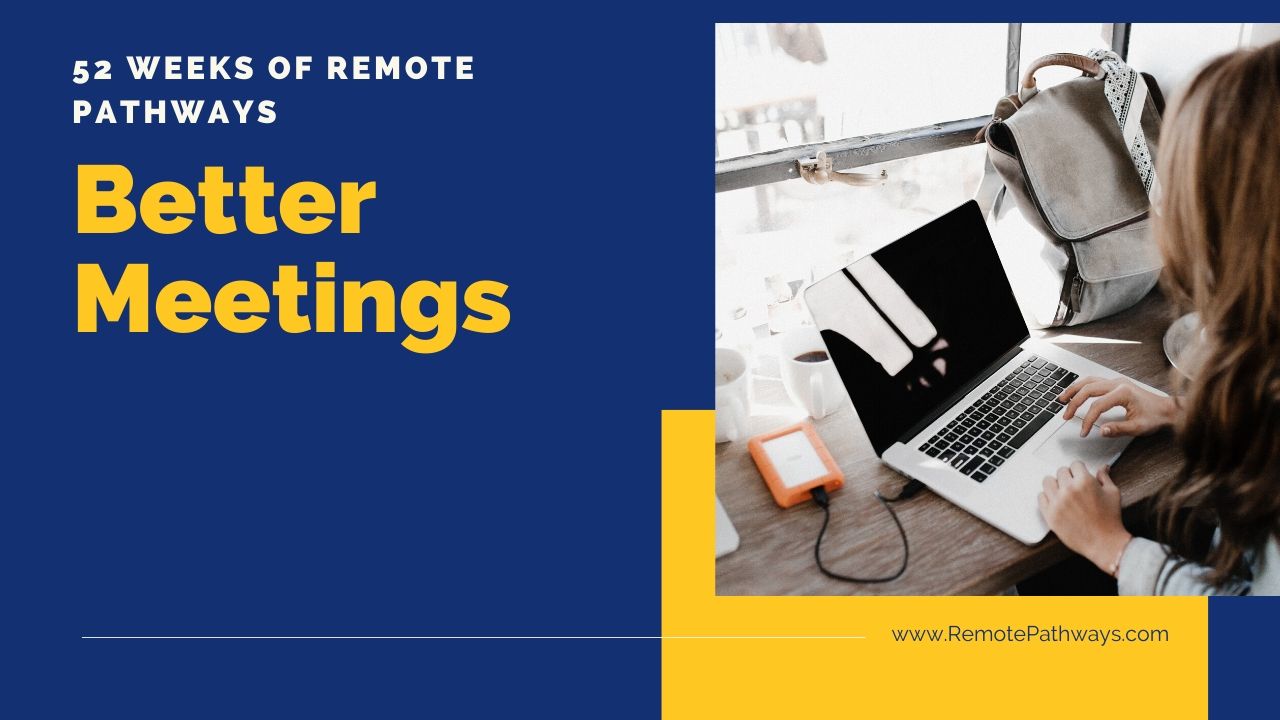
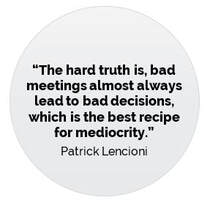
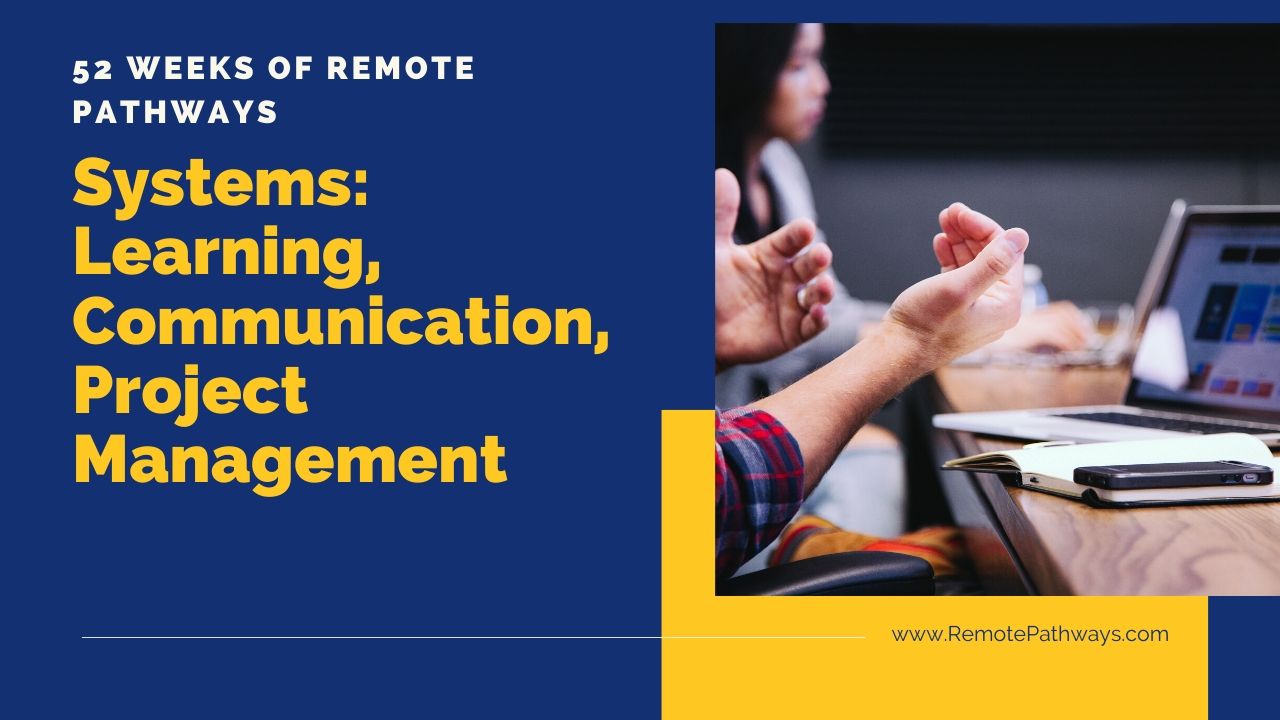
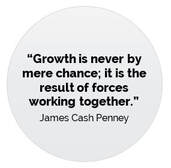
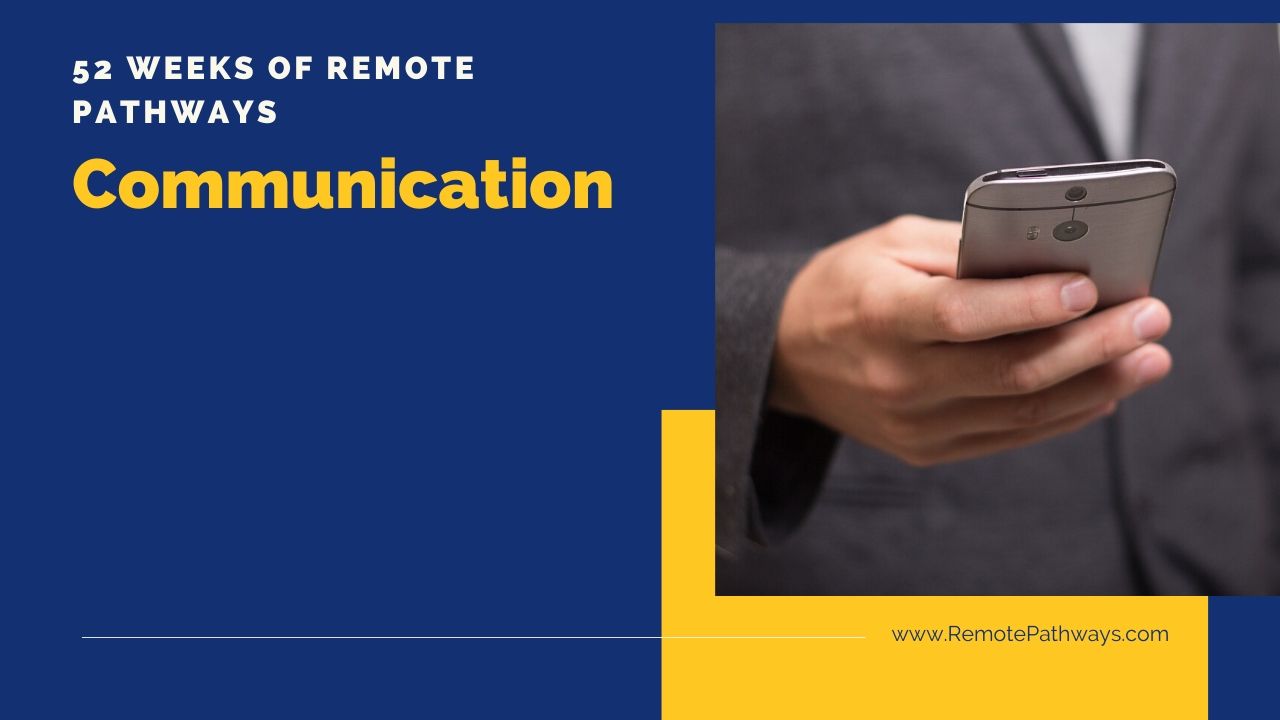
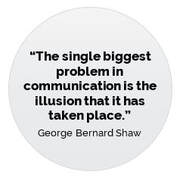
 RSS Feed
RSS Feed